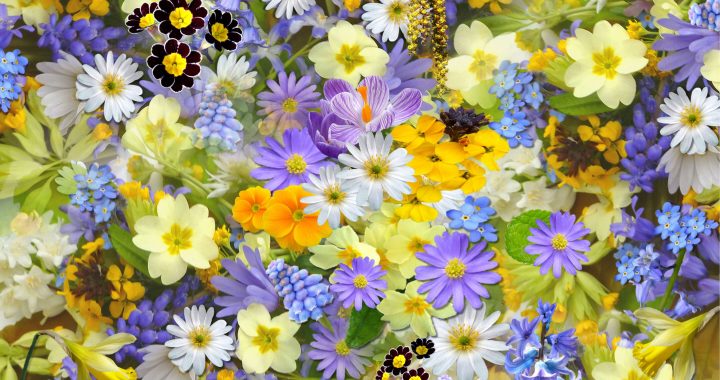Discover the hidden messages behind every bloom with our extensive guide. Uncover the secrets of popular flowers and their unique significance.
From expressing love to conveying sympathy, this guide will help you choose the perfect floral arrangement for any occasion. Don’t miss out on the opportunity to speak the language of flowers and make a lasting impression.
At The Brighton Flower Company, we sell bouquets for all occasions. Shop our range of flowers online today and brighten a loved ones day.
Popular flowers and their meanings
Roses, tulips, daffodils, bluebells, and lavender are all well-known flowers that hold significance in the language of flowers. Each of these flowers carries its own unique message, and understanding their meanings can help you express your feelings and emotions in a thoughtful and symbolic way.
Roses
Roses aren’t just beautiful flowers, they also carry deep symbolism and meaning. Here are some of the different flower meanings associated with roses:
- Red Roses: These classic flowers symbolise love and passion. They’re often exchanged between romantic partners to express deep affection and desire.

- White Roses: Representing purity and innocence, white roses are often used in weddings and other ceremonies. They can also be a symbol of new beginnings and fresh starts.
- Yellow Roses: These sunny blooms are a symbol of friendship and joy. They’re perfect for showing appreciation and gratitude to a close friend or loved one.
Whether you’re looking to express love, purity, or friendship, roses have a language all their own. Their meanings transcend borders and are universally understood, making them a popular choice for expressing emotions in the language of flowers.
-
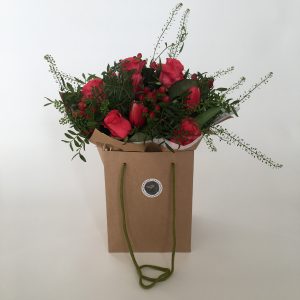 The Rouge BouquetPrice From: £45.00
The Rouge BouquetPrice From: £45.00
Tulips
Tulips are known for their vibrant colours and elegant shape, making them a beloved choice in gardens and flower arrangements. However, did you know that different colours of tulips convey different messages?
- Red tulips symbolise a declaration of love, making them a perfect choice for expressing your romantic feelings.
- Yellow tulips represent hopeless love, indicating unrequited affection.

Whether you’re looking to express your deep affection or acknowledge unreciprocated feelings, tulips offer a beautiful and meaningful way to convey your emotions.
-
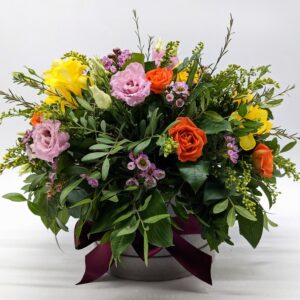 Colourful Hat BoxPrice From: £45.00
Colourful Hat BoxPrice From: £45.00 -
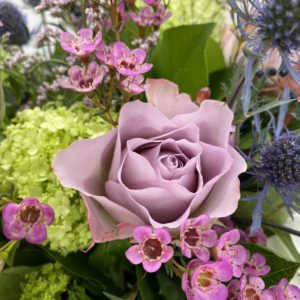 A Florist’s Choice BouquetPrice From: £35.00
A Florist’s Choice BouquetPrice From: £35.00
Daffodils
When it comes to daffodils, the vibrant blooms symbolise new beginnings and are often associated with the arrival of spring. These cheerful flowers have a rich meaning and cultural significance.
- In the language of flowers, daffodils represent rebirth and renewal, making them a popular choice for gifts during times of change or starting afresh.
- Daffodils are known for their bright yellow colour, which brings joy and optimism. Their trumpet-shaped flowers symbolise hope and the promise of a brighter future.

Whether you’re giving daffodils as a gift or simply enjoying their beauty in your garden, these delightful flowers serve as a reminder to embrace new beginnings and look forward to the wonders that lie ahead.
Bluebells
Bluebells are a popular flower often associated with tranquillity and the arrival of spring. Bluebells symbolise humility and gratitude.
In folklore and myths in the UK, bluebells are believed to bring good luck and protect against evil spirits. These delicate flowers with their vibrant blue petals are a common sight in woodlands, creating a beautiful carpet of colour.

Bluebells have long been admired for their beauty and are often used in floral arrangements and garden displays. Their calming blue hue represents peace and harmony, making them a perfect gift for someone in need of tranquillity.
Bluebells also signal the arrival of spring, bringing a sense of renewal and new beginnings.
Lavender
If you’re looking to add a touch of relaxation and tranquillity to your garden, consider lavender – a popular flower with a soothing fragrance and a variety of meanings. Lavender isn’t just a beautiful addition to your garden; it also carries symbolism and significance.
Here are a few meanings associated with lavender:

- Calmness and serenity: Lavender is often associated with a sense of calmness and serenity. Its delicate purple blooms can help create a peaceful and tranquil atmosphere in your garden.
- Healing and protection: Lavender has long been used for its healing properties and is believed to have protective qualities. It’s often used in aromatherapy and natural remedies for its calming effects on the mind and body.
- Love and devotion: Lavender is also associated with love and devotion. Its sweet fragrance and delicate appearance make it a popular choice for romantic gestures and expressions of affection.
-
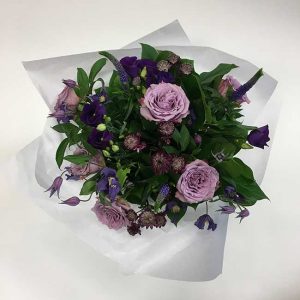 Ultra Violet BouquetPrice From: £45.00
Ultra Violet BouquetPrice From: £45.00 -
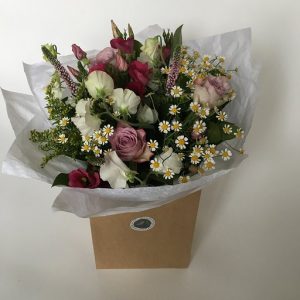 Dainty Daisy BouquetPrice From: £45.00
Dainty Daisy BouquetPrice From: £45.00 -
 Brighton SeasidePrice From: £45.00
Brighton SeasidePrice From: £45.00
Occasions and Appropriate Flowers
When it comes to special occasions, such as weddings, funerals, birthdays, and anniversaries, the choice of flowers can convey specific meanings and emotions.
Each occasion calls for different flowers that symbolise love, sympathy, celebration, or remembrance.
Weddings
For weddings, choosing the appropriate flowers is essential to create a meaningful and beautiful atmosphere. The wedding flowers you select can convey messages and emotions that enhance the overall experience of your special day.
Here are some flowers commonly used in weddings and their meanings:

- Roses: Symbolising love and beauty, roses are a classic choice for the bridal bouquet. Different colours have different connotations, with red roses representing passionate love and white roses symbolising purity and innocence. Other popular choices include pink roses which symbolise appreciation and admiration.
- Lilies: Known for their elegance and grace, lilies are often associated with purity and devotion. They can add a touch of sophistication to any wedding decor. Popular colours include white and pink lilies.
- Peonies: These lush and romantic flowers symbolise prosperity, good fortune, and a happy marriage. With their soft petals and delicate fragrance, peonies are a popular choice for brides looking for a dreamy and feminine touch.
Funerals

As you plan a funeral, it is important to consider the appropriate flowers for the occasion and their symbolic meanings. Flowers play a significant role in funerals, as they express emotions and offer comfort during a time of grief. Different cultures have varying traditions and beliefs regarding funeral flowers, so it is essential to be mindful of these cultural considerations. To help you choose the right funeral flowers, here is a guide to some common funeral flowers and their meanings:
| Flower | Meaning |
|---|---|
| Lily | Peace and innocence |
| Rose | Love and remembrance |
| Chrysanthemum | Grief and honour |
| Carnation | Sympathy and gratitude |
| Orchid | Eternal love and beauty |
Birthdays
To celebrate birthdays and convey your well wishes, it’s important to choose appropriate flowers that align with the recipient’s preferences and the occasion. Consider these options:
- Roses: Symbolising love and admiration, roses are a classic choice for birthdays. Opt for vibrant colours like red or pink to express passion and affection.

- Lilies: Representing purity and innocence, lilies are perfect for celebrating milestones or honouring someone’s youthful spirit. Choose white lilies for a touch of elegance and grace.
- Sunflowers: Radiating happiness and positivity, sunflowers are ideal for cheerful birthday celebrations. Their bright yellow petals are sure to bring a smile to the recipient’s face.
You can also research a person’s birth month flower and buy them a birthday bouquet filled with these flowers.
Anniversaries

Celebrate anniversaries with the perfect flowers that convey your pure love and appreciation for your partner’s enduring presence in your life. Each anniversary year has a specific flower associated with it, making it easier for you to choose the right one.
For example, on your first anniversary, tradition suggests giving carnations, which symbolise young, passionate love.
On your fifth anniversary, daisies are a popular choice, representing innocence and purity. As you reach your tenth anniversary, daffodils are a fitting option, symbolising new beginnings and happiness.
Whatever the year, remember that the language of flowers can enhance the sentiment behind your anniversary celebration.
Browse our bouquets
So, next time you’re looking to send a thoughtful gift or express your feelings, consider the language of flowers. With their rich symbolism and meanings, flowers have the power to convey a wide range of emotions, making them the perfect choice for any occasion.
Here at the Brighton Flower Company, we stock a range of beautiful bouquets packed full of different flowers for all types of occasions. Take a look at our range online, or pop along to our Brighton and Hove store.
We are also able to create bespoke bouquets, so if you want to gift someone a bouquet of flowers with a particular message, then we can help you to create this.
Frequently asked questions
Are there any flowers that have negative meanings or should be avoided in certain situations?
There are indeed flowers with negative meanings that should be avoided in certain situations. It’s important to be aware of these meanings to ensure you don’t inadvertently send the wrong message. Avoid flowers such as the black dahlia or orange lily when gifting flowers.
Is it appropriate to give flowers as a gift to a male recipient, and if so, are there specific flowers that are more suitable for men?
Yes, it is appropriate to give flowers as a gift to a male recipient. There are specific flowers that are more suitable for men, such as sunflowers, orchids, or lilies.
Read our guide to flowers for men
Can the colour of a flower affect its meaning, or is it primarily determined by the type of flower?
Yes, the colour of a flower can affect its meaning. While the type of flower is important, different colours can convey different emotions or messages. It’s worth considering the symbolism of the colour when choosing a flower.
Are there any cultural or regional differences in the meanings assigned to certain flowers?
Yes, there can be cultural or regional differences in the hidden meanings assigned to certain flowers. People in different areas may interpret the symbolism of flowers differently based on their traditions and customs. Here are a few examples of cultural or regional differences in the meanings assigned to certain flowers:
In Western cultures, roses are commonly associated with love and romance. Red roses, in particular, symbolise deep love and passion. In some Asian cultures, like China and Japan, red roses symbolise happiness and prosperity. White roses, on the other hand, are associated with purity and are often used in funerals.
In many Asian cultures, the lotus flower holds deep spiritual significance. It represents purity, enlightenment, and rebirth. In ancient Egypt, the lotus flower was seen as a symbol of creation and rebirth as well. It was often associated with the sun and the concept of resurrection.
In Western cultures, chrysanthemums are often associated with death and used as funeral flowers. In many Asian cultures, particularly in China and Japan, chrysanthemums are seen as symbols of longevity, happiness, and good luck. They are often used during festivals and celebrations.
In Western cultures, lilies are often associated with funerals and symbolise purity and innocence. In some Asian cultures, like China and Japan, lilies are associated with motherhood, fertility, and rebirth. They are often given to expectant mothers or used in celebrations of childbirth.
In Western cultures, sunflowers are often associated with happiness, positivity, and warmth. In Native American cultures, sunflowers have spiritual significance and are seen as symbols of strength, harvest, and fertility.
These examples demonstrate how the symbolic meaning assigned to certain flowers can vary greatly depending on cultural and regional contexts. It is important to consider the cultural background and traditions of a specific group when interpreting the symbolism of flowers.
